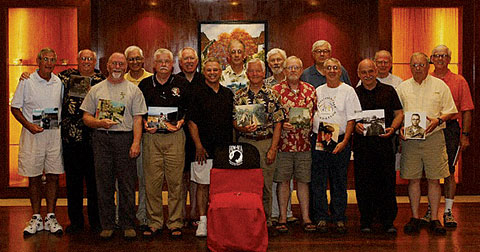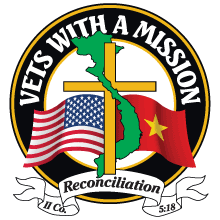 |
|||||||||
|
March/April 2012
On A Mission To Win 21st Century Hearts BY WILLIAM TRIPLETT
Back home in California, Kimball started VWAM as a nonprofit group reflecting the faith of its founder: Rooted in Christian principles of helping the less fortunate, its mission would be to provide humanitarian aid to the former enemy nation. Veterans who shared the faith joined, and the group’s first project was the renovation of a polio orphanage in Saigon in 1989. As Bob Peragallo, chair of VWAM’s board of directors and also a pastor, wrote about the project: “The orphanage was in a pitiful state of disrepair. The children were using outdated, crude braces to walk. The therapy pool was dry with broken and missing tiles everywhere. The well that supplied the pool with water, as well as the main water supply to the orphanage, were not working and had been abandoned for years.” As they worked amid polio-stricken children and the nuns who cared for them, the VWAM team seemed to experience something transformative. “All of us were brought to a new measure of meekness and humility,” Peragallo wrote, noting that it wasn’t uncommon for former Marines to shed tears when holding one of the kids. Kimball has since retired from VWAM, but organization officials say the conciliatory spirit of his original experiences has endured to sustain the sixty humanitarian teams that have gone back to Vietnam for similar projects over the last twenty-three years. In that time teams have built some forty medical clinics and rural health stations in addition to providing medical supplies and equipment. VWAM also built a school. With the Vietnamese government’s knowledge, the group also has distributed Bibles and Christian literature in areas where teams have worked. In a country that prohibits religious proselytizing and evangelizing, this may be the strongest evidence that VWAM’s humanitarian works are having a positive impact. VWAM team members say they know they’re having a positive impact because of the appreciative welcome they receive from locals. And, though suspicious at first, the Vietnamese government has encouraged VWAM to return, according to organization officials. VWAM also seems to be having a good effect on other people—the veterans themselves. During his tour with the Navy from 1969 to spring of 1972, Chuck Ward served on an aircraft carrier off the coast of what was then South Vietnam. On the occasions he was in the port of Da Nang, Ward stayed mainly on the base there. “I didn’t have much interaction with the Vietnamese people,” he said. “I didn’t know them very well, so I had no real negative feelings toward them.” Ward, an at-large VVA member and the executive director of Vets With A Mission, made his first trip back to Vietnam in 1992 as part of advance construction teams for VWAM projects in Da Nang and Hue. While he didn’t know what to expect, Ward distinctly remembers experiencing no unsettling or difficult emotions either before the trip or during the entire time he was there. Then he went back a second time. On that trip two years later, Ward began thinking of people he had known who had been killed in the war, one group in particular. “When I was in high school there were five of us on the bowling team,” Ward says. “Four of us went to Vietnam. I was the only one to return.” He says “a lot of survivor guilt and anger” finally caught up with him, and he had to wrestle with it all during that second trip. “But it really helped to meet ex-VC and ex-NVA soldiers when I was there. They had already moved on from the war. I spent a lot of time with them, and it didn’t take long to see that they were just like us—they had been soldiers doing what they had to do, what our governments wanted us to do, but they were really just normal people. And they were very happy we were there.” One encounter bordered on the surreal. Ward and five other VWAM team members were in Da Nang, and as they walked past an army barracks, they heard loud whooping and hollering and laughing. “We looked inside,” Ward says, “and these soldiers were all drunk and watching Platoon,” Oliver Stone’s 1986 movie based on his experiences as an infantryman in Vietnam. “When they found out who we were, they wanted us to watch the movie with them.” Ward adds that the young Vietnamese soldiers were gracious hosts. Not all VWAM team members on a project are veterans. The organization welcomes all volunteers. But Ward says those who are veterans often have experiences similar to his. “We have these reconciliation dinners when we’re there,” he says. “We take about ten or twelve of our guys, veterans, and we dine with about ten or twelve former VC or NVA soldiers. It is absolutely amazing to see the reconciliation that happens. Every now and then someone can’t handle it, but that’s the exception.” While humanitarian aid lies at the center of the VWAM mission, it appears to be just the foundation of something potentially more significant. “Projects are great,” says Roger Helle, vice chair of the VWAM board, “but people have souls. We’re all going to spend eternity somewhere, and to be able to help other people’s lives, build relationships with other people, that’s the real satisfaction.” Helle didn’t always feel that way. His third tour of duty with the Marines in Vietnam ended when he was wounded a third time. He says he had spent about half his time in-country living in villages among peasants. Although he sympathized with their plight, he wouldn’t have cared too much if the country disappeared under a mushroom cloud after he left. He had seen a lot of good people die. For nearly five years Helle suffered nightmares and all the usual symptoms of PTSD. He says he didn’t begin to feel better until he became a Christian in 1974 and learned the power of forgiveness. At that point he began to feel compassion for the Vietnamese people and wanted to help them. In 1989 he got his chance by accompanying one of the first VWAM teams to Vietnam. He has since gone back sixteen times. Why do they keep going back? Ward, who has made at least as many trips, has the short answer: “It’s the right thing to do.” For Helle, a similar answer lies in one of his earliest experiences returning to Vietnam, when he found himself in a meeting between VWAM team members and local authorities not far from where Helle’s company had almost been wiped out in an ambush in 1966. One of the men at the meeting turned out to be the former enemy regiment commander. “Talk about awkward,” Helle says. “He starts asking me, ‘Why are you doing all this to help us?’ ” Helle says, “I told him, ‘God has taken away all my pain of Vietnam. He loves me. He loves you. I love you. And that’s why.’ The translator couldn’t translate everything for a minute because she was crying. When she finished, the guy got up and walked around the table and gave me a hug.” VWAM’s most recent project involved sending a medical team last summer to provide care for Vietnamese women and girls in Da Nang. The organization’s plans for 2012 are focused on opening a permanent project office in Da Nang and shipping over a mobile unit—“a renovated Winnebago RV outfitted for medical use that will be used for rural medical teams and disaster relief,” Ward says. Helle sees an irony in the relationships VWAM is building with the Vietnamese people. “The first time we were all in Vietnam, we were trying to win hearts and minds. Well, we didn’t stay long enough. Now we’re going back to touch as many hearts and minds as possible.” And they’ll keep going back, he says, as long as possible.
|
|||||||||
|
|
|||||||||
8719 Colesville Road, Suite 100, Silver Spring. MD 20910 | www.vva.org | contact us |
|||||||||










 Vets With A Mission was born following a visit Bill Kimball made to Vietnam in 1988. Twenty years earlier, Kimball had been a mortarman with the U.S. Army’s 1st Cavalry Division during the Tet Offensive. As was the case with many others who served in Vietnam, he witnessed an otherwise beautiful country suffer immense destruction and devastation. In 1988 when Kimball went back for the first time, he was a pastor, and not much in Vietnam had changed. The rubble of war was still evident, and many parts of the country lacked basic infrastructure—particularly for health care.
Vets With A Mission was born following a visit Bill Kimball made to Vietnam in 1988. Twenty years earlier, Kimball had been a mortarman with the U.S. Army’s 1st Cavalry Division during the Tet Offensive. As was the case with many others who served in Vietnam, he witnessed an otherwise beautiful country suffer immense destruction and devastation. In 1988 when Kimball went back for the first time, he was a pastor, and not much in Vietnam had changed. The rubble of war was still evident, and many parts of the country lacked basic infrastructure—particularly for health care.